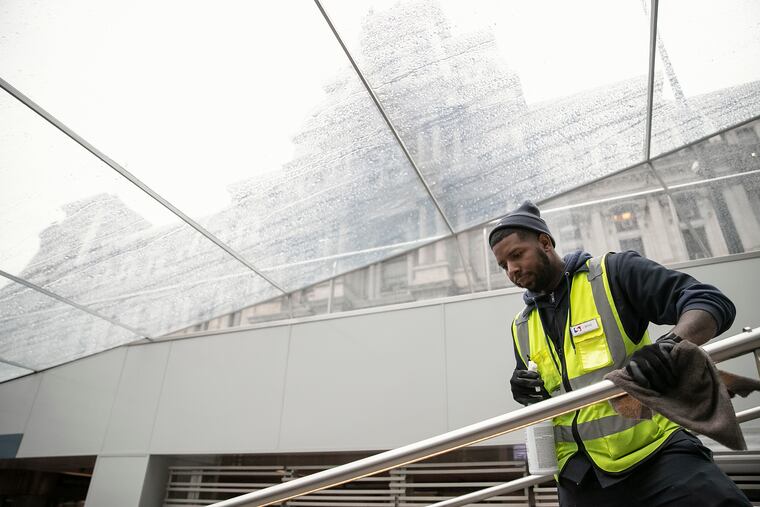How SEPTA, PATCO are handling coronavirus concerns
“It is safe to continue to take our service, and we will continue to run our regular service as we see how this thing evolves," said SEPTA's assistant general manager for system safety,

What is public transportation doing to address fears as confirmed cases of coronavirus mount in the U.S.? It’s a question on riders’ minds.
The region’s transit authorities, including SEPTA, PATCO, and NJTransit, hear concerns loud and clear. All three are taking preventive steps by boosting cleaning efforts, sharing common-sense tips, and keeping an eye on updates from health officials.
“SEPTA is open for business," said Jim Fox, SEPTA’s assistant general manager for system safety, during a Friday news conference at City Hall. “It is safe to continue to take our service, and we will continue to run our regular service as we see how this thing evolves.”
Fox joined Mayor Jim Kenney, city Health Commissioner Thomas Farley, and other officials at the news conference on the city’s preparations, following Gov. Tom Wolf’s declaration of coronavirus disaster in Pennsylvania on Friday.
Two presumptive positive cases were identified in Pennsylvania on Friday, one from Delaware County and the other from Wayne County. Three presumptive positive cases in New Jersey are being tested by the Centers for Disease Control and Prevention.
The risk to Philadelphians is still believed to be low, Kenney said.
But the global outbreak has raised questions around public transportation, where rush hour crowds sometimes leave riders no choice but to pack close together. The coronavirus halted public transportation in Wuhan, China, where the virus is believed to have originated, and prompted action from the MTA in New York, and MBTA in Boston.
Concerns are easy to find on social media.
Henry Fraimow, infectious-disease specialist at Cooper University Health Care, said there’s no need to stray from public transportation at this time, even with Pennsylvania’s disaster declaration. It’s always good to brainstorm a contingency plan, though, he said.
Fraimow recommends that riders use the same precautions they’d take during flu season: Avoid touching your face after touching surfaces and carry hand sanitizer when soap and water aren’t available, for example.
“People should be cautious about going anywhere where they’re going to be touching common surfaces,” he said.
The issue, he said, is more about mass gatherings than public transportation. Taking a bus or subway is no more of a threat than going to see a Sixers game at the Wells Fargo Center. Riders feeling unwell should be conscious of their surroundings, too.
“The public transportation system is not only a way for you to catch something, but for you to spread something,” he said. “So it works both ways.”
SEPTA
In addition to daily cleaning, SEPTA is increasing efforts by sanitizing such high-touch areas as turnstiles and kiosks at least three times a day, said Scott Sauer, SEPTA assistant general manager of operations. Every vehicle will get a full wipe-down every 14 days instead of every 30 days.
Efforts will be systemwide, but focus will be on highly trafficked spots such as the 15th Street, City Hall and 69th Street stations as well as Frankford Transportation Center, Sauer said. Riders can expect signage communicating preventative common sense tips at stations and online, as well.
SEPTA has not seen a dip in ridership, Fox said.
“At this point, there’s really no information, no evidence, that stipulates that there should be anything that the rider should do differently other than practice their good hygiene," Fox said.
PATCO
PATCO officials are enhancing daily cleaning and sanitation of highly touched surfaces as a precautionary measure. It’s stocking up on cleaning products, protective equipment, and parts for repairs “in the event of a supply-chain disruption,” said Mike Williams, spokesperson for the Delaware River Port Authority, the agency that oversees the High-Speed Line.
» READ MORE: Coronavirus prompts PATCO to act to prevent fare card shortage
“The health and safety of our employees and customers is our highest priority,” he said.
PATCO officials also provided common-sense tips, and the DRPA shared an informational video with riders earlier this week.
NJTransit
NJTransit is disinfecting vehicles every 24 hours and enhancing cleaning efforts on surfaces that riders come in contact with most, such as ticket vending machines, handrails, and door handles, according to a Friday update from spokesperson Kate Thompson.
“The cleaning agents used in this effort are deemed effective for these purposes and contain anti-viral components such as bleach/water mixes and other disinfectant sprays,” Thompson said in a statement.
Earlier this week, NJTransit announced that it had deployed an internal task force to coordinate efforts with state agencies.
The transportation system is working closely with the New Jersey Department of Health, and monitoring updates with other state and federal officials.